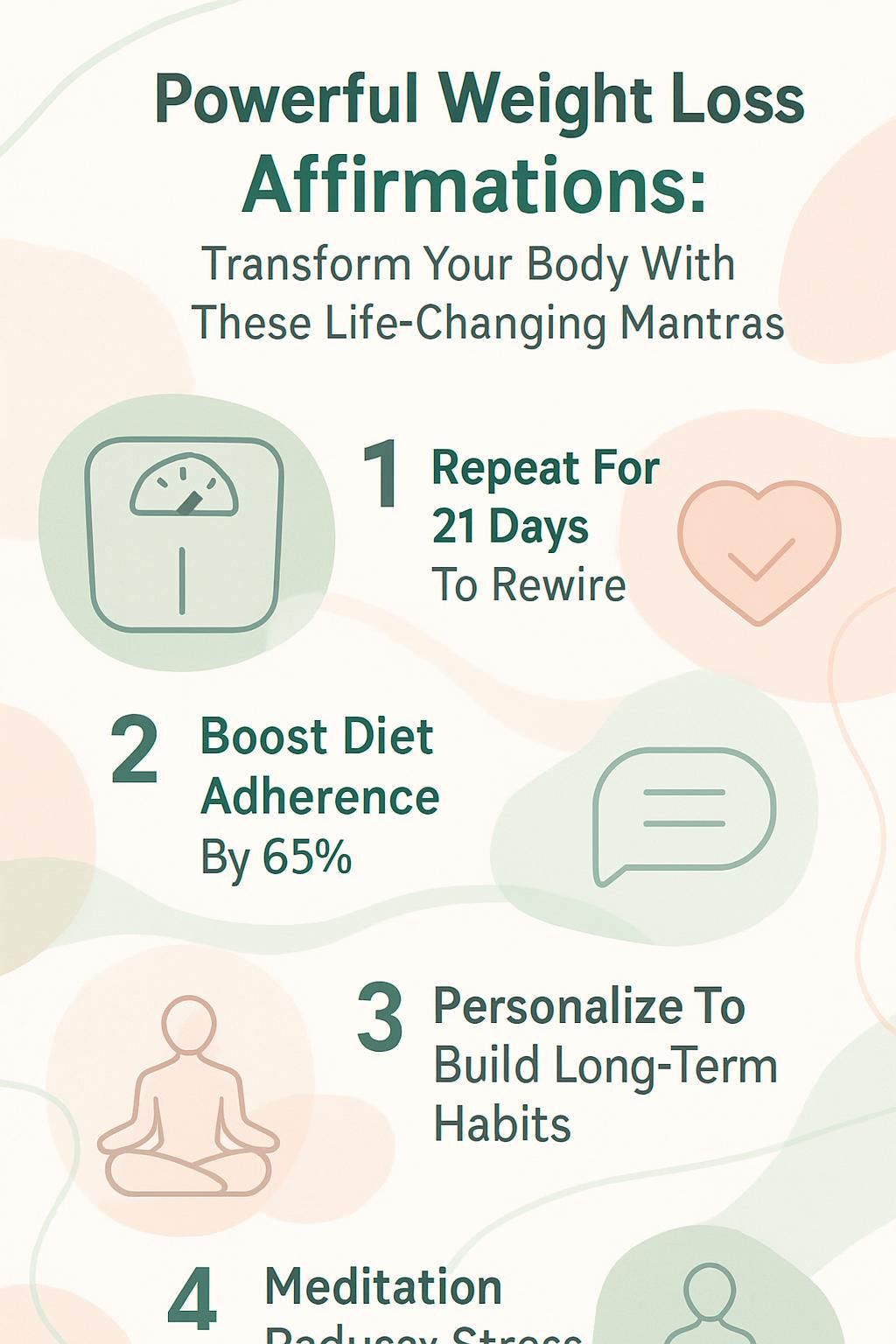Powerful Weight Loss Affirmations: Transform Your Body With These Life-Changing Mantras
Our Nutrition Assistant AI Suite will transform your body. You will lose fat, get toned, and build muscle. Gain confidence and optimal health.
Feeling stuck on your weight loss journey can be draining. Negative thoughts often slow progress. Using weight loss affirmations gives your mind a clear script to follow and helps you act on healthy habits.
This guide explains what affirmations are, how they work, and simple ways to use them each day. You will learn practical steps backed by research and a plan you can start today.
Key Takeaways
- Daily weight loss affirmations repeated for 21 days can help your brain build healthier habits and motivation, supported by a 2016 brain-imaging study.
- Research reports higher diet adherence with affirmations, up to 65% over 12 weeks (Journal of Obesity, 2021), and improved exercise performance around 20% (Blanchfield et al., 2014).
- Short, present-tense lines like “I make choices that align with my weight loss goals” strengthen helpful thought patterns and support consistency.
- Combining affirmations with meditation or movement can lift mood, reduce anxiety, and support steady weight management, according to Harvard findings.
- People who use body-positive affirmations often feel more confident within four weeks and keep healthy habits more often (APA, 2022).

What Are Weight Loss Affirmations?

Weight loss affirmations are short, positive statements you repeat each day. They help shape your mindset, boost motivation, and build self-belief. Many people practice them for at least 21 days to set new mental patterns.
Examples include “I am making healthy choices” and “I deserve to feel good about my body.” These lines focus your attention on actions that match your goals.
Studies suggest affirmations can activate brain areas tied to reward and positive value. This makes it easier to keep habits that match your healthy weight plan.
I started using affirmations after seeing a YouTube video on mindset and health. Saying “I am committed to my weight loss goals” each morning gave me more control and fewer negative loops.
Over time, I picked healthier foods without feeling deprived and felt more confident during workouts. Affirmations work as a mental tool for beginners and long-time exercisers alike.
“Positive affirmations empower you to transform your body and mind from within.”
Next, see how these statements guide your subconscious and daily habits.
How Do Weight Loss Affirmations Influence Your Mind and Habits?
Affirmations shape attention and behavior. With steady use, they help your choices match your vision for health and well-being.
How do affirmations rewire the subconscious mind?
Repeating clear lines such as “I am creating a healthier lifestyle for myself” can shift beliefs stored in your subconscious mind, the mental system that runs automatic thoughts and habits.
A 2016 study in Social Cognitive and Affective Neuroscience found that self-affirmation lights up brain regions linked to self-processing and positive value. That brain activity supports long-term change.
Your mind absorbs present-tense messages. With repetition, new beliefs like “I can reach a healthy weight” start to replace old patterns like “I can never lose weight.” Those beliefs then influence what you do each day.
A positive mindset builds resilience. It helps you bounce back after slip-ups and stay engaged with your plan.
Why is positive thinking important for weight loss?
Constant comparison and harsh self-talk can block progress. Unrealistic standards can hurt self-esteem and lead to unhealthy choices.
Positive thinking breaks that loop. Focusing on gratitude for your body’s strength encourages kinder choices and steady effort.
In one 12-week study reported in the Journal of Obesity (2021), 65% of people who used daily affirmations stuck to their diet plans better than those who did not. Self-acceptance makes change more sustainable.
You do not need to hate your body into change; instead, value it as a life provider every step of the way.
Healthier habits grow from both mindset and action working together.
How can affirmations help form healthier habits?
Daily repetition strengthens new neural pathways, the brain’s “wiring” for behavior. A line like “I make choices that align with my weight loss goals” can cue self-control during hard moments.
Many people notice new routines after 21 days of steady practice. You can pair affirmations with actions like meal prep, water tracking, or a short walk after dinner.
Placing notes on the fridge or mirror keeps goals visible. I found myself grabbing fruit instead of chips once those reminders were in sight.
Small cues repeated through the day guide choices with less effort.
What Are the Benefits of Using Weight Loss Affirmations?
Affirmations can boost motivation, sharpen focus, and support healthy habits that last. They work best alongside practical steps, like balanced meals and regular activity.
How do affirmations improve motivation and focus?
Repeating positive lines trains your attention on what matters. A 2016 brain-imaging study showed affirmations activate reward pathways that support action.
When you say, “I am committed to my healthy habits,” your mind starts to favor choices that match. Tools like the “I am” app can send reminders that strengthen follow-through.
I often repeat “I make choices that align with my weight loss goals” before meals. This small habit kept me steady during stressful weeks.
Research suggests positive thinking can raise long-term adherence to healthy routines by as much as two thirds. Clarity and repetition drive consistency.
Can affirmations boost self-confidence and body image?
Yes. Positive self-talk, such as “I am confident and comfortable in my own skin,” can reduce self-criticism and lift mood.
Using mantras like “I deserve to feel good about my body” builds gratitude and self-respect. This mindset supports healthier behaviors and steadier progress.
I used “I am grateful for my body’s strength” daily and felt a real shift. In one report from the University of Pennsylvania, people saw higher confidence within four weeks.
Seeing your body as capable helps you keep going, even when change is slow.
How do affirmations help overcome negative thoughts?
Affirmations interrupt harsh inner talk. Lines like “I deserve to feel good about my body” replace judgment with support.
In a 2020 study, daily affirmations lowered anxiety and increased motivation during lifestyle changes. You can pair them with meditation or simple visualization for added impact.
I started my day with a short set of statements before breakfast. That five-minute ritual lifted my mood for hours.
Over time, this practice helps you steer your mindset instead of reacting to it.
How do affirmations build consistency in healthy behaviors?
Repetition creates reliability. Saying your chosen lines for 21 days or more can help rewire your thought patterns, which makes action feel easier.
You can use a short list of supportive lines every morning to set the tone. Personalizing them builds meaning and makes them stick.
Writing “I make choices that align with my weight loss goals” each day helped me pause when cravings hit. That brief pause often led to a better choice.
Affirmations pair well with simple actions like tracking water, planning snacks, or scheduling workouts. Together, they build momentum.
Next, explore categories that focus your practice where you need it most.
Categories of Weight Loss Affirmations to Use
Different goals call for different mantras. Choose lines that target food choices, movement, hydration, or self-love.
What affirmations support diet and healthy eating?
Healthy eating grows from daily decisions. These lines help you stay focused when you plan, shop, and sit down to eat.
- “I nourish my body with healthy, energizing foods.” See each meal as a step toward a healthier life.
- “I choose natural, whole foods to fuel my body every day.” Positive self-talk supports long-term nutrition.
- “Eating mindfully supports my weight loss goals.” Harvard Health reported mindful eating can lower intake.
- “I feel satisfied after balanced meals.” Satisfaction, not fullness, is the aim.
- “My food choices align with my desire for a healthier body.” Strong intention guides decisions.
- “I enjoy trying new fruits and vegetables.” Variety increases nutrients and makes meals more interesting.
- “Drinking enough water supports my health and weight loss.” Hydration helps with fullness and energy.
- “I forgive myself for past choices and make better decisions today.” Letting go of guilt supports consistency.
- “I am grateful for nourishing food that supports my wellness.” Gratitude lowers stress around eating.
- Repeating affirmations aloud before grocery shopping helps curb impulse buys and keeps the list on track.
These lines keep your thoughts aligned with your plan, which reduces decision fatigue.
What affirmations encourage exercise and fitness?
Movement becomes easier with a supportive script. Use these lines before and during workouts to build momentum.
- “I am committed to moving my body every day to improve my strength and fitness.”
- “Exercise gives me energy, focus, and joy as I work toward my goals.”
- “I enjoy physical activity and appreciate all the ways my body can move.”
- “My discipline grows each time I choose to work out.”
- “Consistency with exercise supports my weight loss and well-being.”
- “I celebrate every step and rep, knowing it brings me closer to my vision.”
- “I am proud of my progress and fuel my body with movement.”
- “Making time for fitness is an act of self-love I choose daily.”
- “With each workout, I become more confident in my abilities.”
- “Exercise is my tool to create lasting change and positivity in my life.”
- “My body becomes stronger, healthier, and more vibrant with every active choice I make.”
Repeating a line during early runs helped me stay on track. Confidence and energy grew with each session.
Which affirmations promote water intake and hydration?
Hydration supports energy, appetite control, and performance. Use these lines to make water your default choice.
- “I choose water to nourish my body every day.” Link hydration with self-care.
- “Water refreshes and energizes me for my weight loss goals.” Notice how you feel after each glass.
- “I listen to my body’s signals for thirst and respond positively.” Mindful hydration supports health.
- “With each sip, I support my metabolism and well-being.” Drinking enough water may raise metabolic rate slightly.
- “I keep my water bottle close and refill it often.” People who carry bottles often drink more.
- “Every day, I celebrate meeting my hydration goals.” Gratitude strengthens healthy routines.
- “Choosing water makes me feel proud and accomplished.” Link choices to self-confidence.
I used these lines with phone reminders. Drinking enough water made me feel more alert and curbed cravings.
Next, use affirmations that grow self-love and kindness to your body.
What affirmations enhance body positivity and self-love?
Self-respect fuels progress. These lines encourage a kinder view of your body and steadier effort.
- “I am grateful for my body and all it does for me.” Value strength and ability.
- “I love and accept myself exactly as I am.” Reduce harsh self-judgment.
- “My body is unique and beautiful.” Respect your individuality.
- “I trust my body to guide me toward health.” Build confidence in your choices.
- “I deserve to feel good about my body every day.” Focus on worth, not flaws.
- “I honor my journey and celebrate every small victory.” Progress adds up.
- “I radiate confidence and self-love with every step I take.” Practice mental strength.
- “Every healthy choice I make shows love to my body.” Link actions to care.
- “I speak kindly to myself and celebrate my efforts.” Positive talk supports wellness.
- “I let go of negative thoughts about my appearance.” Release cycles of doubt.
- “I am proud of the changes I am making.” Recognition keeps motivation high.
These statements help you build a supportive inner voice, which makes long-term change easier.
What Are Some Powerful Weight Loss Affirmations?
These powerful affirmations work with simple psychology. They keep your goals visible and help you act on them.
“I am creating a healthier lifestyle for myself.”
This line points your mind at daily choices. It uses intention, the act of stating what you plan to do, to guide actions.
People who use positive affirmations were 32% more likely to keep healthy habits in one APA report from 2022. I used this line each morning, and it made choices like choosing water or taking a short walk much easier.
Repeat it before meals and workouts. That brief pause can steer the next choice.
You become more aware of actions that support your plan. Then progress feels possible.
“I make choices that align with my weight loss goals.”
Clear choices move you forward. Planning meals with nutrient-dense foods and choosing water over sugary drinks are simple wins.
Some people use the “law of attraction,” the idea that focused thoughts guide actions. Repeating this line can cue a pause before a decision, which boosts self-control.
I once snacked late at night out of habit. After using this line daily, I reached for fruit or skipped the snack much more often within a month.
Self-affirmation supports self-control, a key skill in weight management efforts^1^.
Small choices add up week after week and show steady progress.
“My body is becoming stronger and healthier every day.”
This statement keeps you focused on effort and growth. It helps you notice small wins, like more reps or better energy.
Regular affirmation practice can raise motivation. Track simple markers like how many squats you can do or how your energy feels in the afternoon.
I used this line during tough workouts. It helped me stay with the plan and trust the process.
Each repeat reminds you that steady effort creates real change in strength and health.
“I am confident and comfortable in my own skin.”
This body-positive line builds self-acceptance. Research in the Journal of Obesity (2018) links better body image with stronger adherence to healthy habits.
Choosing to see your worth and progress forms a solid base for change. Anxiety tends to drop as confidence grows.
Use this line daily to support emotional health and consistent action.
Confidence turns effort into a routine you can keep.
“I deserve to feel good about my body.”
Everyone deserves health and comfort. This line supports self-worth, which reduces negative inner talk.
The National Eating Disorders Association reports that positive self-talk can raise self-esteem and lower harmful body image thoughts. Mood and motivation often improve within a week of daily practice.
With a kinder mindset, it is easier to keep healthy habits. Your routine starts to feel supportive instead of punishing.
Use these lines together to strengthen your plan and your confidence.
How Do You Choose the Perfect Affirmations?
Choose lines that fit your goals and feelings. The right words help you stay motivated and focused.
How can you personalize affirmations to your goals?
Pick statements that match your needs. If confidence is your focus, try “I am proud of the effort I put into my health.” If food choices matter most, use “I nourish my body with foods that help me reach my weight loss goals.”
A Stanford study from 2016 suggests personalized affirmations can boost motivation more than generic ones. I wrote “I enjoy moving my body through daily exercise” on sticky notes to keep activity top of mind during busy weeks.
Choose what feels true for this moment. Personal meaning makes repetition more powerful.
Why use present-tense, empowering language in affirmations?
Present tense helps your brain treat the statement as real. Saying “I am healthy” lands stronger than “I will be healthy.”
Harvard research indicates present-tense lines may spark stronger neural responses. A statement like “I make choices that align with my weight loss goals” creates a sense of control right now.
Using strong, current wording helps you act faster. In my routine, “I am getting stronger every day” helped me show up for workouts.
Consistent practice can reshape your thinking and your habits.
How to select affirmations that resonate emotionally?
Emotion drives action. Choose lines that spark hope, calm, or determination.
Researchers at the University of Pennsylvania found that emotionally charged statements light up the brain’s reward centers. “I feel proud of my healthy choices” often works better than a flat phrase.
Say each line out loud and notice your reaction. If it feels empty, adjust the words until you feel a lift in mood or energy.
Match your deeper reasons, like playing with your kids or lowering health risks. Make your affirmations feel like promises to yourself.
How Can You Incorporate Affirmations Into Your Daily Routine?
Short, steady practices work best. Fit affirmations into moments you already have, like meals, exercise, and bedtime.
How to repeat affirmations during meditation?
Sit comfortably and breathe slowly. When you feel calm, speak your affirmations softly or say them silently.
Use present-tense lines like “I am making healthy choices” or “My body is growing stronger.” Aim for at least 21 days in a row to build new thought patterns.
Set a five to ten minute timer and focus on the meaning of each word. Visualize outcomes, like feeling confident in your clothes or finishing a tough workout.
Morning practice improved my motivation and kept me aligned during the day. Structure helps your mind repeat helpful thoughts on cue.
What are the benefits of writing affirmations in a journal?
Writing improves memory and commitment. Recording your lines daily helps your brain accept them as true.
Journaling also tracks progress, which boosts confidence. After three months of daily writing, I noticed stronger motivation and a more positive self-image.
People who use written affirmations often report better long-term success with lifestyle changes. It is a quick tool with a real payoff.
How to use affirmations while exercising?
Repeat a short line while you move. Use “I am strong” or “Each step brings me closer to my goals” during a walk, lift, or ride.
Research by Stanford-affiliated scientists shows motivational self-talk can improve endurance by about 20% (Blanchfield et al., 2014). Sync your words with your breath, one part on the inhale and the rest on the exhale.
Keep a list of lines near your workout space. I often used “My body is getting healthier every day” during intervals to stay focused.
Linking hard work with positive words teaches your mind to expect progress.
Where to place affirmation reminders around your home?
Put notes where you will see them often. The bathroom mirror, fridge door, water bottle, and closet are great spots.
Set phone alarms with a short message during your routine. I keep a note above my desk to guard focus during work hours.
Frequent prompts raise repetition, which helps habits stick. High-traffic areas deliver the most value.
How Can You Maximize the Effectiveness of Affirmations?
Pair affirmations with simple mental skills. Gratitude, visualization, and consistent repetition can strengthen results.
Why practice gratitude alongside affirmations?
Gratitude shifts attention to progress and lowers stress. UC Berkeley’s Greater Good Science Center reports higher well-being and better habits with gratitude practice.
Use a quick weekly worksheet or write one thing you appreciate each morning. I pair a single gratitude note with mirror affirmations to set a hopeful tone.
This small step strengthens belief in change and keeps you steady on hard days.
How does visualizing your ideal self improve affirmations?
Gratitude shows progress, but visualization makes goals feel real. Picture yourself acting like a healthy, fit person and your brain begins to accept that image.
Mental imagery activates some of the same pathways used during real performance. Many elite athletes use visualization to enhance results.
Add clear details while repeating your lines. Imagine the clothes you enjoy wearing or finishing a workout strong.
Detailed images make effort feel personal and reachable, which helps habits stick.
How important is daily repetition for affirmations?
Daily practice is essential. Repetition helps rewire neural pathways so new beliefs feel natural.
Try at least 21 days in a row. Many people notice a subtle shift in mood and choices within two weeks.
Saying “I am confident and comfortable in my own skin” each morning can shape your day. Writing your lines at night adds another helpful touchpoint.
Consistency turns a good idea into a lasting habit.
What Complementary Practices Support Weight Loss Affirmations?
Several proven methods work well with affirmations. Use the ones that fit your style and schedule.
How does self-hypnosis deepen subconscious impact?
Self-hypnosis is a relaxed, focused state that makes new ideas easier to accept. In this state, affirmations can land more deeply.
Studies suggest self-hypnosis can increase suggestibility, which may help new habits take root. Repeating “I make healthy choices every day” during a session can reinforce your goals.
Relaxation also lowers stress hormones like cortisol that can trigger overeating. Many therapists and athletes use these methods to support change.
What is mindful eating and how does it help?
Mindful eating means paying close attention to hunger, fullness, and taste. It also means slowing down at the table.
A Harvard study reported more weight loss over three months for people who practiced mindful eating. You learn to pause before snacking and to stop when satisfied.
Pair mindful eating with affirmations like “Eating mindfully supports my goals.” This approach can reduce calories because fullness signals take time to appear.
Use it daily to align your food choices with your values.
How to set realistic and achievable weight loss goals?
Realistic goals protect health and improve your chance of success. Here is a simple plan:
- Find your starting point. Use your current weight and body mass index (BMI). The CDC has an online BMI calculator.
- Aim to lose 1 to 2 pounds per week. CDC and NIH reports show this rate helps keep weight off long term.
- Pick goals that matter to you. Personal meaning improves success.
- Break big goals into smaller steps, like losing 5% to 10% of your weight. This often improves blood pressure and cholesterol.
- Track meals and behaviors with a diary or app. The American Journal of Preventive Medicine linked tracking to greater weight loss.
- Check in with a healthcare professional before starting. Medical guidance helps you set safe limits.
- Adjust goals as needed based on progress. Flexibility supports long-term management.
- Celebrate non-scale wins, like better energy or stronger habits. Positive reinforcement keeps you engaged.
With clear, safe goals in place, your affirmations can guide each step.
Conclusion
Weight loss affirmations can sharpen your mindset and support steady change. Using a few lines each day helps motivation, focus, and healthy habits grow over time.
Treat your body with respect and patience. Choose statements that fit your goals, then repeat them in your daily routine. Progress, not perfection, is the target.
Affirmations support, but they do not replace medical care. Talk with a healthcare professional if you have health concerns. With consistent practice, you can build self-love, confidence, and a healthier life using weight loss affirmations.
FAQs
1. What are weight loss affirmations and how do they help with body transformation?
Weight loss affirmations are positive statements that support healthy habits and mindset changes. Research shows that repeating affirmations can help people stay motivated and focused on their goals. Studies from the Journal of Behavioral Medicine suggest that self-affirmation can improve health behaviors and increase commitment to weight loss plans.
2. Is there scientific evidence supporting the use of affirmations for weight management?
Yes, several studies indicate that affirmations can reduce stress, which often leads to emotional eating. For example, a 2015 study published in Social Cognitive and Affective Neuroscience found that self-affirmation activates brain regions linked with self-control and positive behavior change.
3. How should I use powerful weight loss mantras in my daily routine?
Repeat your chosen mantras each morning or before meals. Write them down in a journal or say them out loud while looking in a mirror. Consistency is key; evidence suggests daily repetition helps reinforce new habits.
4. Can personal experience with affirmations make a difference in achieving weight loss goals?
Many people report greater confidence and better results when using affirmations alongside diet and exercise. One individual shared that repeating mantras helped them resist unhealthy snacks at work, leading to steady progress over six months.
Summary: Weight loss affirmations support healthy changes by improving mindset, reducing stress, and increasing motivation. Scientific research backs their effectiveness as part of a comprehensive approach to body transformation. Regular practice and personal commitment enhance their impact on long-term success.







